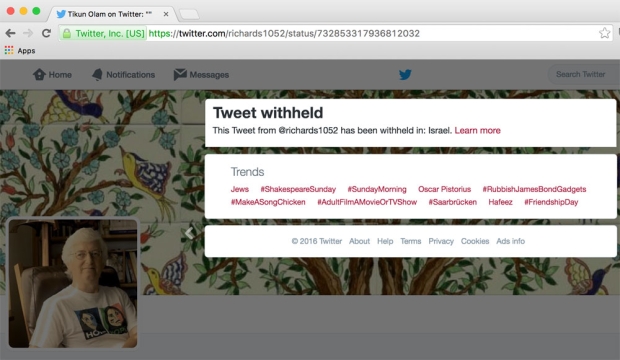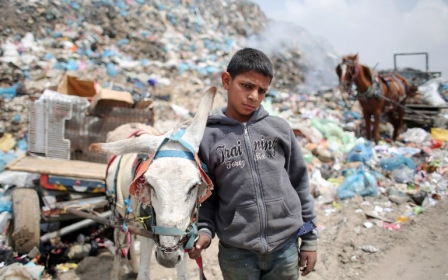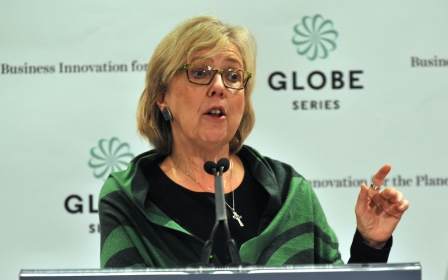Israel censors social media content that violates 'Israeli law'

Israel has moved to block foreign Twitter posts and other published material from being viewed inside the country, under the accusation that they violate Israeli law.
According to the left-wing Israeli news site +972mag, pro-Palestinian blogger Richard Silverstein received a warning from Twitter that a post of his violated international law and asked if he would be willing to remove it of his own volition.
Twitter later informed him that the post had been restricted from Israeli viewing:
In a statement to +972mag, the Israeli justice ministry said its cyber division "works, among other activities, with various internet providers to remove content that violates Israeli law, including the terms of use of the providers themselves".
"The division acts against forbidden content like the publication of paedophilia content, incitement to violence and racism, and publications that violate judicial or statutory gag orders."
A ministry spokesman denied that it had called for any direct action on Twitter's behalf with regards to the Silverstein case, and said it had merely "brought the violation of the gag order to the company’s attention”.
Israel has long had a policy of imposing reporting bans following attacks and other major incidents - the Israeli military censor holds the authority to suppress information that could be deemed to pose a national security risk.
However, concerns have arisen that censorship of information seen as critical of Israel is becoming more commonplace.
In February, the military censor contacted around 30 bloggers and administrators of Facebook pages calling for them to submit content for review.
According to information released by Facebook, the social media site restricted 236 pieces of content between July 2015 and December 2015 following Israeli government requests.
Tehilla Shwartz Altshuler, the head of the media reform programme at the Israel Democracy Institute, criticised the apparently intrusive nature of the censor's actions.
“On the face of it, it looks like adding insult to injury: Not only do the defence regulations constitute an anti-democratic arrangement that does not recognise the right to free expression, the censor is now asking to expand these bad arrangements to the digital world, instead of fixing them," she told Haaretz.
"It is unreasonable that the system chooses to expand [the censor’s ] authority instead of using it in proper measure, under the perception that the world of 2016 can continue to operate in the reality of the beginning of the 20th century.”
Last month, the justice ministry announced it would be introducing legislation to allow courts to order the removal of content from Facebook which it deemed encouraged acts of terrorism, shaming, insulting public servants and defamation, according to Haaretz.
“In light of the potential harm to freedom of expression, orders to remove content will be given sparingly, in extreme cases and directed only at harmful content,” said a statement released at that time.
New MEE newsletter: Jerusalem Dispatch
Sign up to get the latest insights and analysis on Israel-Palestine, alongside Turkey Unpacked and other MEE newsletters
Middle East Eye delivers independent and unrivalled coverage and analysis of the Middle East, North Africa and beyond. To learn more about republishing this content and the associated fees, please fill out this form. More about MEE can be found here.





